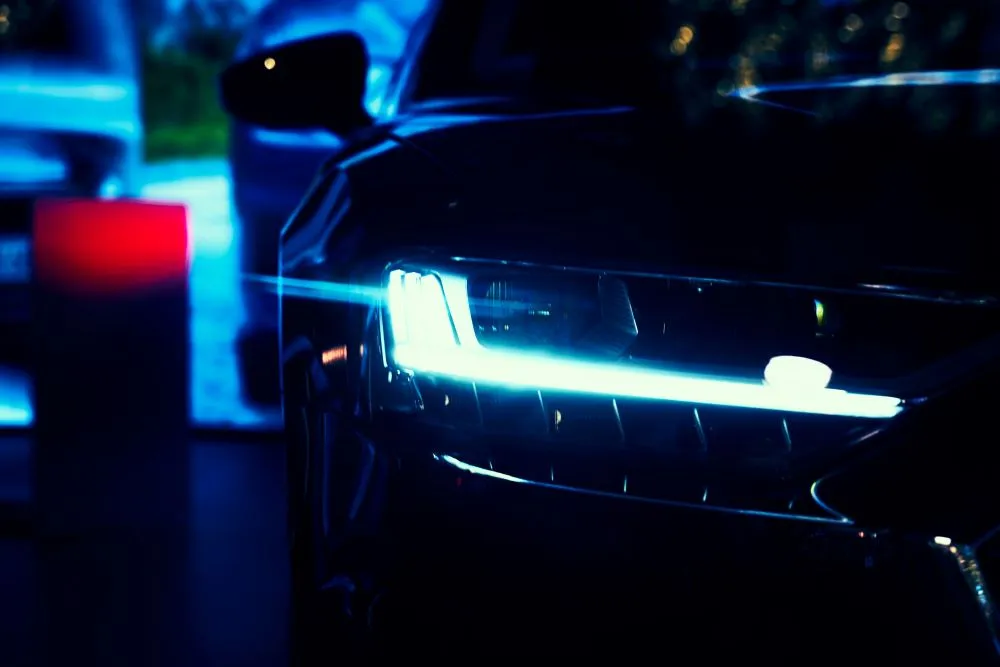89% of drivers say headlights are too bright!

Have you found yourself dazzled by bright car headlights while driving recently? If so, you aren’t alone. A growing number of motorists have found themselves squinting against the glare of an oncoming car’s lights, says the RAC.
Their survey of 2,000 drivers found 9 in every 10 drivers (89%) think at least some headlights on cars on the road today are too bright. Of this group, three-in-10 (28%) – a higher proportion than ever – think most are too bright.
Of the all these drivers who complain about the brightness of car headlights, 91% say they get dazzled when driving, with three-quarters (74%) saying this happens regularly. With all these bright lights, what effects are they having on drivers?
Beyond the annoyance or discomfort, some say the high levels of brightness are posing a danger on Britain’s roads. 67% who suffer say they have to slow down considerably until they can see again, while 64% believe some headlights are so bright they risk causing accidents. In fact, 5% of drivers say they have nearly been involved in a collision themselves!
What’s more nearly 1-in-10 (7%) say they find the problem so bad they avoid driving at night together. And this figure rises to 14% for drivers aged 65+.
Now, 85% of people think the problem is getting worse. We decided to investigate what the current rules and regulations are, as well as hearing directly from you on this question!
What’s causing the glare?
There are a few things that could be causing the glare on the road. Firstly, a slight misalignment of a headlight out of its correct position can cause it to impede other drivers’ line of sight.
Secondly, the difference in ride height of different vehicles can mean headlights affect drivers. With SUVs becoming more popular, ‘taller’ cars could be shining their lights through windscreens rather than at front bumpers.
And thirdly, as individuals, we all have variances in our vision. So, the reason you’re squinting from the light can actually be an incredibly specific set of circumstances.
Nonetheless we also need to consider the change from traditional halogen bulbs to Light Emitting Diodes (LEDs), which can improve a driver’s view, but at a detriment to other road users. LED bulbs can create a more intense and focused beam.
How bright can my headlights be?
In the UK, there is no law against having ‘bright’ headlights. However, your headlights do need to meet specific international standards. These standards have not been updated since the 1960s, so they don’t take into account new and developing technologies like LED or xenon.
Headlights are covered in the Highway Code. The code specifies that drivers must not “use any lights in a way which would dazzle or cause discomfort to other road users, including pedestrians, cyclists and horse riders.”
And when it comes to LED bulbs, it seems there are different types – one which is legal and another that isn’t. OE (Original Equipment) are perfectly road legal as they are fitted by professionals. However, these bulbs aren’t replaceable. So, if they fail, the entire headlight had to be replaced, which often puts drivers off.
Retrofit LED bulbs are not legal. These are when you replace a normal headlight bulb with an LED version. The reasoning is because LEDs are not omnidirectional and require a lens to focus the light being produced. So, using an LED bulb in a headlight unit it’s not designed for means it will be much brighter, and not configured correctly, possibly dazzling other drivers.
Coping with glare – what you can do
While you can’t control the actions of others, there are a few steps you can take to help reduce glare from other drivers. Firstly, make sure you’re using your rear-view mirror efficiently at night. Some newer cars have self-dimming rear-view mirrors, which can reduce the dazzle from vehicles behind. If you’re changing your car soon, look for one that has one of these mirrors.
But most drivers still need to manually adjust their mirrors in the dark to reduce glare. Dipping it slightly can help you cope with the bright lights at night.
Secondly, if you wear glasses, speak to your optometrist. A glare-minimising coating can improve the issue, by up to 25% for the drivers surveyed.
Tell us what you think!
These figures came from the RAC, but we want to hear from you. Do you agree with these drivers? Has your driving been affected by bright headlights? Let us know in the poll below.
Sources: Driving.co.uk, KwikFit, RAC, Sky News







